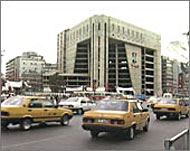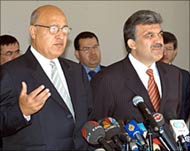Bias taints Turkish anti-corruption drive
While Turkey’s government has forged ahead with a major anti-corruption drive against a string of former cabinet ministers, controversy has now erupted over allegations of political bias – and the untrustworthiness of the country’s judiciary.

“The government wants to appear to have clean hands,” says Istanbul lawyer Yuksel Acar. “And by and large, it has not been implicated in any major scandals, as yet. However, it is not ready to take the same chances that it wants its former opponents to face.”
In mid-December, parliament voted overwhelmingly to launch investigative proceedings into six former ministers. These included former Prime Minister Mesut Yilmaz and former deputy prime minister Cuhmur Ersumer, former state minister Gunes Taner and ex-energy minister Zeki Cakan of the Motherland Party (ANAP), and former Deputy Prime Minister Husamettin Ozkan and ex-state minister Recep Onal of the Democratic Left Party (DSP).
Both parties were previously in the coalition government that ran Turkey before the current administration took office in 2002.
Detailed probes
Ozkan and Onal are to be investigated over losses caused by bad loans made by the state-owned Halk Bank, allegedly in favour of businesses and organisations close to the DSP. Another commission will look into claims that both Yilmaz and Taner abused their office during the selling of the state-owned Turkbank, while a third investigation will probe the many contracts signed when Ersumer and then Cakan were in charge of the energy portfolio. All the men have denied any wrongdoing.
 |
|
The credibility of the drive is not |
In his time in office, Ersumer’s ministry was allegedly involved in corrupt deals that were said to amount to $10 billion. A number of senior Ersumer bureaucratic appointees to the energy sector, including the head of the state owned pipeline authority, have already been found guilty of corruption.
The main investigation into both Ersumer and Cakan, his successor after he was forced to resign in 2002, centres on the construction of a pipeline beneath the Black Sea linking Turkey with Russia and the purchase of Russian natural gas. On coming to power, the AKP renegotiated the gas contract, saving an estimated $15 billion over 20 years.
The inquiry commissions are expected to complete their work by late February, forwarding their results before the parliament for vote to decide whether the ministers will face the Supreme State Council, comprising the cabinet and the president.
Lingering doubts
However, many doubt that the former ministers will ever face the judges. One who is unsure is Ozdemir Ozok, chairman of the Turkish Bar Association Union in Ankara.
“It is totally in the hands of the government whether those former parliamentarians, or present ones who have allegations of corruption against them, will face trail,” he said.
“The reluctance of the very same bodies, which change their views on the issue once they come to power, has been very clear. It is also very clear that corruption allegations become an issue of irrelevance once a party comes to power.”
The drive against the former ministers comes as Turkey is trying to restructure its economy, stamp out endemic corruption, and woo wary foreign investors.
The government is also under pressure from the International Monetary Fund and the World Bank to improve transparency in state tenders and to stamp out corruption. A 2002 study listed Turkey as among the worst ten countries for corruption, a record the AKP says it wants to redress and have those guilty put on trial.
 |
|
Ruling party officials are being |
However, it is a trial that the AKP wishes to spare its own elected officials. The parliament’s AKP dominated Immunity Commission in mid December refused to sanction a proposal by the opposition Republican Peoples’ Party (CHP) to lift an all-encompassing immunity from prosecution for Turkey’s parliamentary deputies.
Controversial stand
The AKP controversially justified its refusal by saying there was little public confidence in Turkey’s judiciary system, due to a perceived lack of independence.
While saying that many in Turkey’s legal system were honest, Deputy Prime Minister Mehmet Ali Sahin said there was still a view that justice could be bought.
“Unfortunately this is a fact,” he told reporters. “It is the comment of the people, not of parliamentarians. The people have such a worry.
“Both the government and judiciary has a responsibility to increase credibility of the judiciary,” Sahin continued. “But I have expressed, as a former member of the judiciary, my sorrow over the fact that the judiciary had been revealed to be at the bottom of a list of credible institutions in a recent survey.”
This view seemed to be borne out in a report from the leading Turkish Industrialists’ and Businessmen’s Association (TUSIAD), in mid January.
It said that there was “a common view” among the Turkish public that “there is no justice in the country”.
This, the report said, was “due to the lack of swift and fair trials” with the result that people “believe there is no use in applying to the courts”.
Popular outrage
Yet, Sahin’s comments drew outrage from opposition and judicial leaders.
“If you do not have trust in the judiciary,” asked Supreme Court of Appeals head Eraslan Ozkaya, “why are you sending those who are no longer in government to the judiciary for trial? Why shouldn’t parliamentarians be taken to court while everyone else faces trial?”
 |
|
Foreign Minister Gul(r) faces |
The opposition CHP then published a list of 17 senior members of the AKP who have outstanding charges against them, including Foreign Minister Abd Allah Gul and Interior Minister Abd al-Kadir Aksu, who is responsible for Turkey’s police and investigative authorities. Both are wanted over allegations concerning fraud.
In total, the CHP document listed more than 130 cases involving deputies in the current parliament, far more than the number of cases being looked into against members of the former coalition.
Ironically, Turkey is one of the first countries in the world to sign the new United Nations Convention Against Corruption at a ceremony in Vienna. There, Foreign Minister Abd Allah Gul, said the signing of the convention was a sign of the government’s determination to combat corruption.